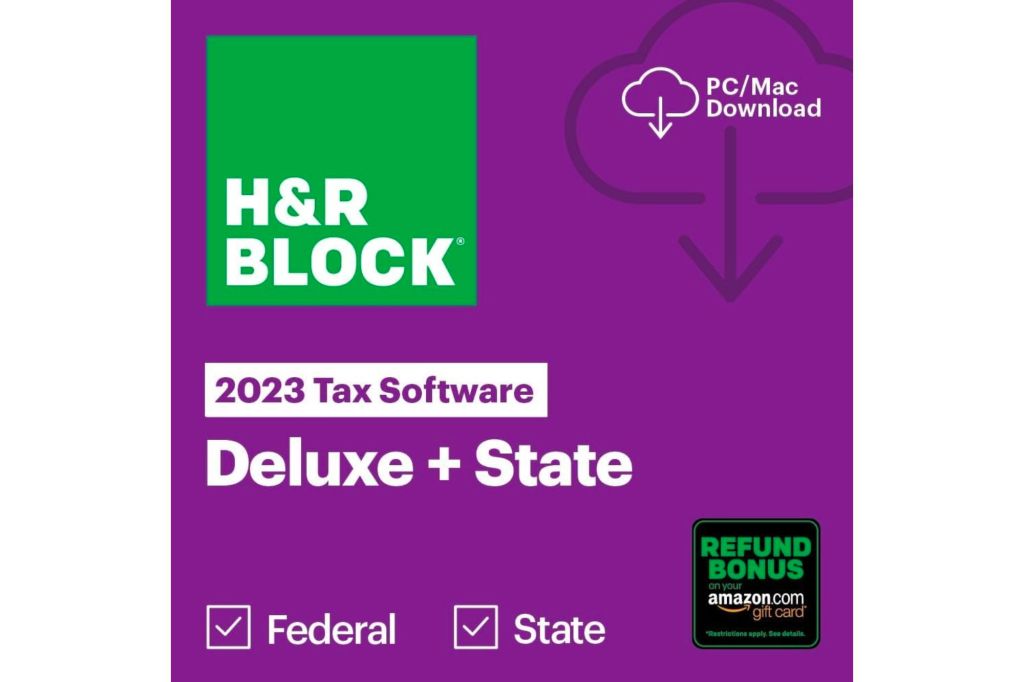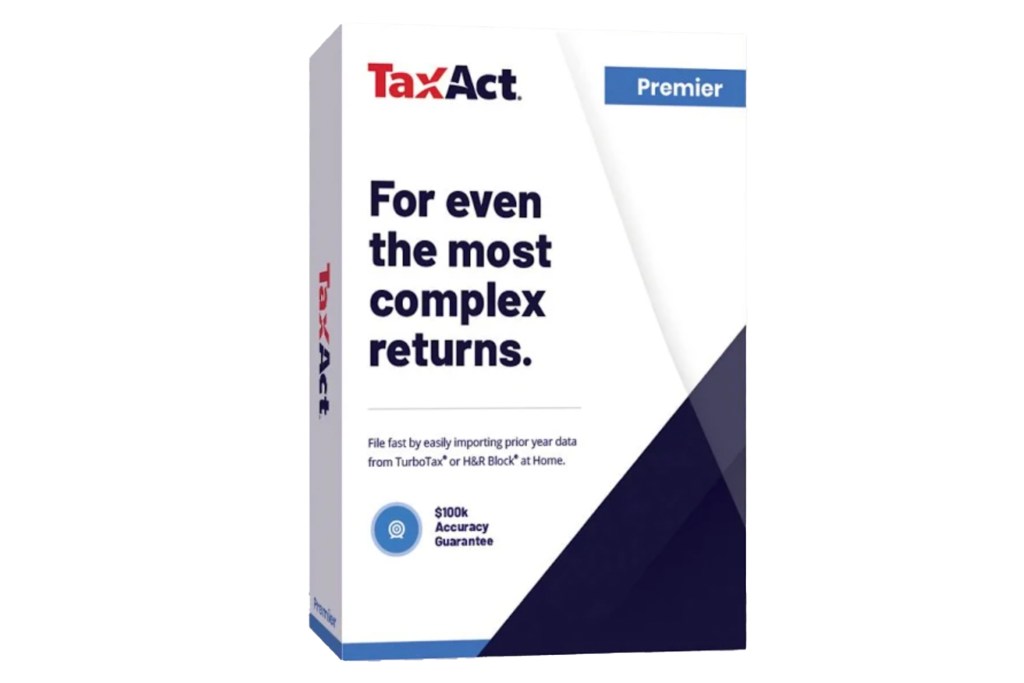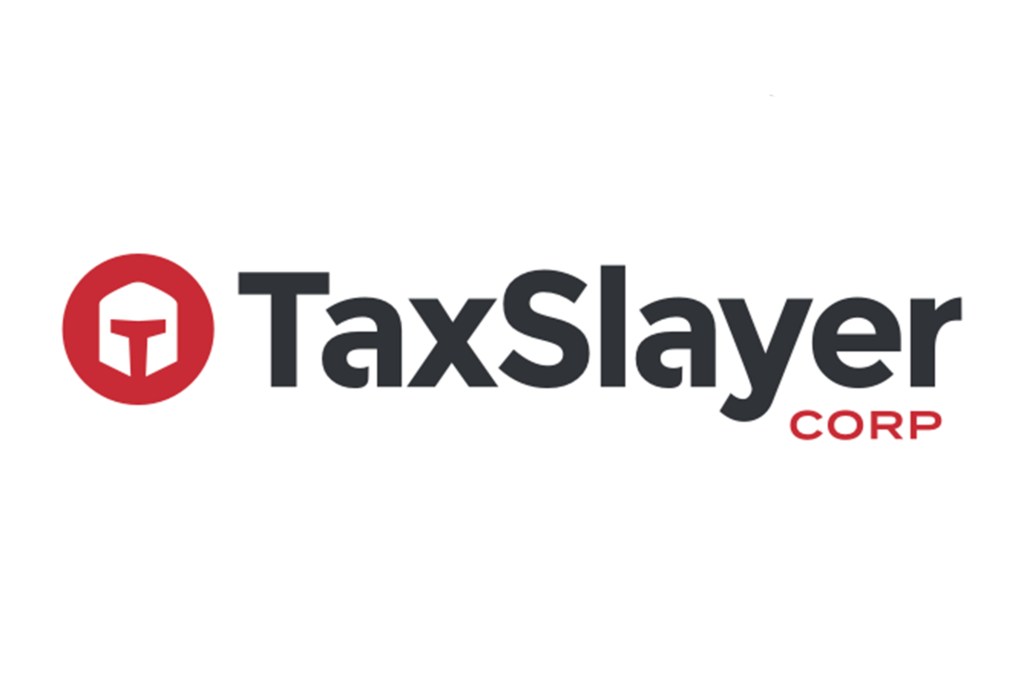The truth is, tax season is almost near. So, it’s time to look into which tax software you’d like to buy for online filing ASAP.
Before you click out of another mundane article about filing taxes (ahem, don’t), we’re here to bring you the five best tax software programs to file your income and other commitments before the April 15, 2024 deadline.
And, we’re well-versed on the topic for this quick guide, Garrett Watson — a senior policy analyst at The Tax Foundation who conducts research on federal and state tax policy — answers an FAQ on taxes below.
Find the best tax software to file your taxes and rest assured that all is complete before the deadline (which is Monday, April 15 for most states).
Add at least one to your cart now so you’re well-equipped to do that money crunch.
Click to jump to the FAQ with the tax expert:
Best Tax Software to File Online
Best for Home Owners: H&R Block Deluxe + State Tax Software

Pros:
- Guidance with Schedule A
- Audit risk assessment
- Helps with stocks and bonds
Cons:
- Reported issues with software updates that impact accuracy
If you’re a money nerd like we can be, you’ve likely heard of H&R Block. Its Deluxe + State Tax Software bundle is currently on sale and is ideal for those seeking to minimize deductions on your home and other properties.
Aside from providing the filing layout, this bundle uniquely provides step-by-step guidance on more than 350 credits and deductions and, impressively, in-person representation in the unlikely event of an audit.
Best Overall: TurboTax Premier | Investments and Rental Property

Pros:
- Available as a disc or download
- Great for holders of stocks or bonds
- Good for property owners
Cons:
- Some reviewers on Amazon complain of having to create an account on TurboTax in addition to having to download software
- Issues with tech support
From filing stocks, bonds and mutual funds to employee stock plans and rental income and expenses, TurboTax Premier provides a full suite of tracking and filing options for you to have in one centralized hub.
What’s more, you’ll have access to everything in TurboTax Deluxe. Notably, there’s a feature to maximize your IRA savings to get more money back this year and when you retire, along with assistance if you purchased and sold stocks at different prices.
Best for Self Employed: TaxAct Comprehensive Filing System

Pros:
- Four different softwares, including one that’s free
- All software is under $100
- Data privacy and security
Cons:
- Additional fee for live tax support
What’s great about TaxAct is its well-curated bundles that target different classes of individuals: the homeowner, the investor (including real estate) and the self-employed (content creators, we’re talking to you).
Along with specialized options, TaxAct provides virtual live assistance from CPAs and other tax experts with the Xpert Assist add-on. And, in the event of a tax refund, you can even get reimbursed from TaxAct with its Refund Transfer option.
Best for Professionals: TaxAct

Pros:
- Reporting tools
- Data import feature
Cons:
- Software bundles can become pricey
- Additional costs, depending on chosen bundle
Whether you’re a self-employed accountant or part of a practice, TaxAct probably has a tax software bundle for you. Its 1040 Pay-Per-Return Edition, for example, provides one eSignature envelope for each return, as well as gives dedicated tech support and multi user licenses. There’s a handy data import feature to add clients personal data, and the company also has banking products to assist with refunds.
Best Tax Preparation: TurboTax Deluxe

Pros:
- Includes 5 federal e-files and one state download
- Free support for those living in the United States
Cons:
- Some reviewers on Amazon complain of having to create an account on the TurboTax site, in addition to downloading software
TurboTax offers its Deluxe bundle, encompassing federal snd state filings with areas to account for donations, education and medical expenses and mortgage interest. For the typical homeowner and employee, this on-sale tax software is your best bet.
Best for Small Business: TaxSlayer

Pros:
- Affordable
- Includes app to prepare on the go
- Unlimited phone and emails support
Cons:
- Still time consuming but this is more the nature of filing taxes than using the software
As a tax software program with one of the most affordable, baseline options available, TaxSlayer is a clear-cut winner. Its best value package, the Classic plan, helps you file all forms, credits and deductions.
TaxSlayer also has a Premium plan, too, with assistance from a tax professional, along with a Self-Employed plan for filing personal and small business income, 1099 and Schedule C.
Best Crypto: TurboTax Investor Center

Pros:
- Includes online portfolio
- Provides support for more than 12 crypto providers and blockchains
Cons:
- Not a software but platform
Technically, this is more of a platform than software. However, if you’ve been using Bitcoin, or Gemini to stack your virtual dollars, this will help you to estimate your tax outcome. It provides support for more than 12 blockchains, as well as wallets and exchanges, so you’re covered to the fullest. Best of all, it’s free. Yes, free! All you have to do is sign up.
An FAQ with a Tax Expert
Ahead, find the answers to your top tax questions below from Garrett Watson.

What is the deadline to file taxes?
FYI, this year’s national deadline is April 15.
“Taxpayers can request a six-month extension for filing tax returns, but it does not change the payment deadline of April 15,” he adds. “This means that payments remitted after this date for taxes owed may be subject to penalties and interest. The best practice this year is to try and file electronically as much as possible, as the IRS has a large paper return backlog that may increase your risk of delays if you file a return on paper.”
How should I file taxes if I invest?
“Capital gains from investments are taxed as ordinary income if they are realized on an asset owned for less than one year, while capital gains from assets held for longer than one year are subject to lower tax rates,” Watson explains.
That said, taxpayers should submit a Schedule D form with their individual income tax return (or directly on Form 1040 if applicable). Taxpayers may also deduct up to $3,000 in capital losses from ordinary taxable income, but must carry over any additional losses to be used in future tax years, he notes.
What information do I refer to when filing taxes?
“It’s important to have on hand all of the relevant income sources when filling out your tax return, including but not limited to W2 forms for wage income and any taxable benefits, interest income from sources like a savings account and self-employment income,” Watson said.
If you have self-employment income, having a good understanding of your total gross income and expenses that can be deducted from that gross income helps ensure you’re not overpaying or underpaying in taxes, too.
What’s the difference between using tax software and hiring an accounting firm?
“Tax preparation software is well-suited for taxpayers with straightforward tax situations, especially if they do not have a complicated business tax situation and take the standard deduction or limited itemized deductions,” Watson said.
However, for more complicated tax returns, professional preparers can “help identify areas where mistakes are more common and point out any missed opportunities to reduce one’s taxable income,” he adds.
How often does the IRS audit?
The word “audit” has a slightly negative connotation, as nobody wants the IRS probing into your financial affairs. Typically, the organization has “three years to audit most returns after they are filed,” per Nolo, and, at a glance, one out of every 500 tax returns are audited. That’s an audit rate of 0.2% in a three-year time frame.
What triggers an IRS audit?
Additionally, audits are typically flagged for a suite of reasons, including taking large deductions in relation. to your income, claiming a business loss, not reporting all of your income, having evidence to mislead or being “sloppy” with your return, being a higher earner, having self-employment income, having foreign accounts, owning digital assets like cryptocurrency and claiming too many charitable donations.
Is it better to file taxes jointly or separately?
According to TurboTax, being married and filing jointly typically can net you a bigger Standard Deduction which, in turn, reduces your taxable income. Filing together generally means you can earn more and still qualify for certain tax breaks, like IRA contributions and education credits as well.
Moreover, you may pay higher taxes separately than if you teamed up on a joint return. This holds true if only one spouse has taxable income. Filing separately may also allow you to save on medical bills. By clearing the 7.5% threshold on adjusted gross income, you may qualify for medical deductions, considering you’d only be claiming one income.
Why Trust Post Wanted by the New York Post
For over 200 years, the New York Post has been America’s go-to source for bold news, engaging stories, in-depth reporting, and now, insightful shopping guidance. We’re not just thorough reporters – we sift through mountains of information, test and compare products, and consult experts on any topics we aren’t already schooled specialists in to deliver useful, realistic product recommendations based on our extensive and hands-on analysis. Here at The Post, we’re known for being brutally honest – we clearly label partnership content, and whether we receive anything from affiliate links, so you always know where we stand. We routinely update content to reflect current research and expert advice, provide context (and wit) and ensure our links work. Please note that deals can expire, and all prices are subject to change.








